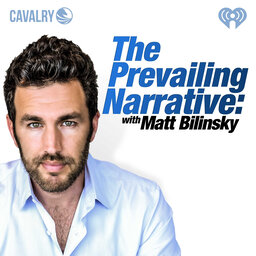Episode 24: Jon Elist
Businessman and son of Iranian refugees Jon Elist has launched his campaign for United States Senate in California. Elist is challenging incumbent Senator Alex Padilla, who was appointed to his position by Governor Gavin Newsom in 2021.
Unlike Padilla, who has been a career politician for nearly twenty-five years and has not had a private sector job since the 1990s, Elist is an outsider, entrepreneur, and successful businessman who brings a fresh perspective that is desperately needed in California and Washington D.C.
In 1 playlist(s)
The Prevailing Narrative with Matt Bilinsky
A lively and fiercely analytical breakdown of news and current events, with interviews of thought le…Follow podcast
Recent clips

Episode 30: "Dark Plots & Secret Explanations": Study Rejects "Chemical Imbalance" as Cause of Depression (Max Lugavere Discusses); Biden & His Media Surrogates Re-Define "Recession; Kansas Abortion Ruling; Zelensky Poses for Vogue(?!); Public Health Lies on Monkeypox
1:38:34

Episode 29: Kamal Ravikant - Silicon Valley Thought-Leader, Investor, & Bestselling Author on Loving Yourself, Stepping Past Fear, Extreme Sharing, Investing Skills, and Living a Life of Honesty, Adventure and Authenticity
1:12:12

Episode 28: Political Scientist Wilfred Reilly on Gun Control, Targeted Solutions, and the Facts and Myths About Gun Violence in America; Nihilism and Mass Shootings
1:44:29
 The Prevailing Narrative with Matt Bilinsky
The Prevailing Narrative with Matt Bilinsky